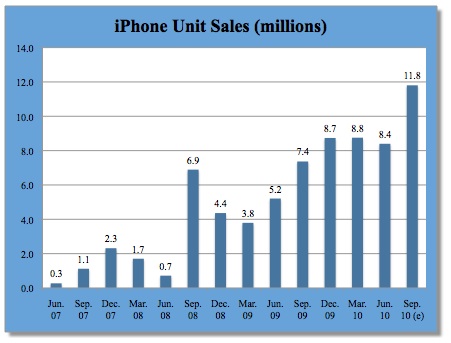Two trends are apparent that seem contradictory: Handheld game consoles are faltering in sales, and smartphone sales are skyrocketing. They are really two sides of the same basic fact: Most people will likely carry only one handheld device with them. Unfortunately for Nintendo and Sony, that's going to be a phone for any adult and most teens.
Part of why smartphones have taken off is that they know incorporate multiple functions. Smartphones were a small market segment when they consisted of Palm OS, Windows Mobile (or Windows CE), Symbian, and Blackberry. Blackberry was a huge hit because of email; it was the corporate must-have. It still is, but it's starting to fade. When Apple introduced the iPhone, it was popular not because of Apps; the App Store didn't even exist (and Steve Jobs apparently wasn't interested in creating an open software market). What sold the iPhone then was the integration of the iPod functionality, which at that point was the overwhelmingly popular handheld device. Plus you had a camera, and you could see pictures and videos, and maps... it was phone/camera/MP3 player/GPS in one device. Once the App Store came around, and you added games to the mix along with a rapidly growing market of Apps for virtually any purpose, the iPhone took off.
Apple's latest quarterly results will be announced October 18th, and analysts are looking for amazing results. It looks like we're seeing around 4 million iPhones sold every month. The iPad is over 1 million per month and will hit 2 million per month in 2011. The iPod Touch is probably doing similar numbers.
The Android market is based on the success of the iPhone, featuring multiple functionality in one device, with an open software market. It, too, is booming, with 6 million Android phones coming online every month.
The Nintendo DS? Selling around 320,000 units per month in August. The PSP is not even breaking 80,000 units a month. Nintendo is hoping to sell 4 million 3DS units in the first month.... and that will certainly drop off once the initial hardcore fans buy one. Nintendo will be fortunate if they are selling 1 million a month after a few months, especially if the price point is $299.
The realities are that there is no way Nintendo or Sony can hope to match the volume of iDevices or Android devices, which means Sony and Nintendo will be unable to match the hardware performance and pricing of Apple or Android. Volume means you can drive hardware pricing lower, and Nintendo is starting way behind in that race.
Oh, and Windows Phone 7 launches today.... millions more devices with an open software market and plenty of hardware horsepower.
Nintendo and Sony are going to see steadily shrinking sales of their handhelds. Their only hope is to open up their devices to be multifunctional. The hardware is perfectly capable of playing music, video and many other functions. Sony could certainly build a PSP2 that could be very nice, hardware-wise. But hardware mojo will not save Nintendo or Sony. If they had an open software market and could encourage developers to come to their platform, they might have a chance. (An Android-based PSP2 could be a real winner... with real gaming controls wedded to the fast-growing software market.) As Skype and other services grow, the need for a telecom company to make a handheld device into a phone is diminishing. Heck, phone calls are growing rarer, as people (especially younger ones) text all the time. So the phone advantage could be less important in a year or two, as long as the gaming hardware provides all the other functionality (Web browsing, music, video, camera, GPS, etc.) that people have come to expect.
The future is about personal handheld computers, not dedicated hardware for games or telephony or texting or music. Some of us can remember when dedicated word-processing machines were all the rage, and obviously so much better than some poor Apple II trying to word-process... we know how that ended up. The long-term trends are obvious; Sony and Nintendo have to get onboard or be left behind. Software developers and publishers need to be aware of this, too. I notice that EA is one of the key publishers of games for Windows Phone 7, so somebody there is thinking ahead. Marketers, don't get stuck in the past. Look forward to capture the next market.
Opting Out of the Bartz v Anthropic
3 weeks ago






No comments:
Post a Comment